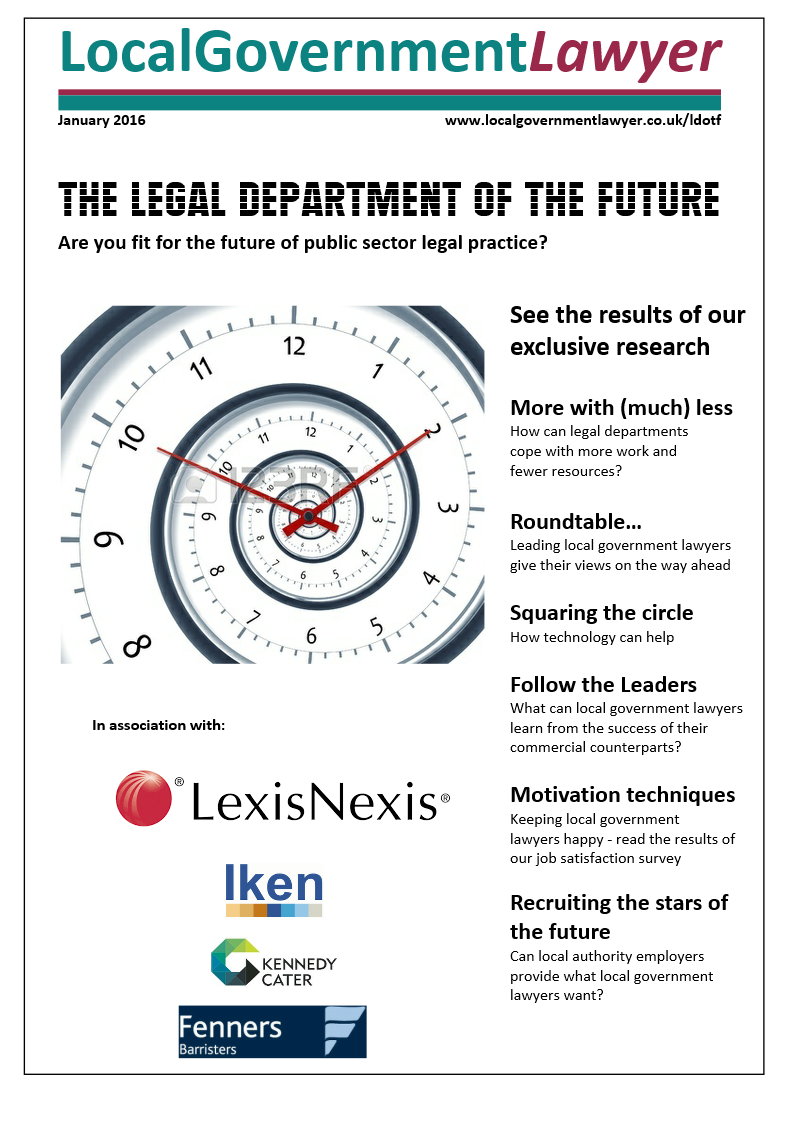Up for the challenge?

With the local government sector under huge pressure, legal departments are being tested to the limit. Helen Edwards of Kennedy Cater analyses how they are responding.
The survey of local authority heads of legal, carried out by Local Government Lawyer, has once again shown that the single biggest management challenge in the foreseeable future is cost control and dealing with budget cuts.
Some 69% of respondents included it in their top three, and for 47% it was the top answer. This shows a sharp increase from the 2012 survey, which perhaps reflects the fact that as local government strives to reach the 40% savings required by the end of this financial year, no department is immune from contributing.
This is despite the fact that respondents reported increases in work, with almost half expecting a significant increase of more than 10%, and a further third expecting to see a rise of between 5 and 10%. Work is not only increasing in volume, but also in complexity.
As councils look for new and innovative ways of meeting the funding gap, this requires strong legal and governance advice in new and developing areas. As one respondent says: “We are a very forward thinking authority – there is never a shortage of different schemes needing legal advice.”
The types of work quoted as driving the increase in legal work suggest that highly skilled and experienced lawyers are needed. Yet the reality reported is that councils are struggling to recruit good lawyers, particularly in areas of growth.
Planning, property, contracts and procurement are all reported as difficult to recruit to, and almost half of respondents expect the position to become worse.
In-house teams face an ongoing challenge of trying to meet demands in these areas, as councils try to become more financially self-sufficient, resulting in more commercial projects, increased regeneration, and budget strategies including sale of assets.
In search of savings
Like every other council service, legal services have been working hard over the last few years to reduce costs through improved efficiency. Many have reached the point where it is difficult to make further savings without impacting on the ability to deliver to the standards required by clients, although interestingly almost three quarters of respondents who were not actively considering a shared service stated that this was because they could meet their needs and improve efficiency within their current structures.
There are also many in-house legal teams that have not made as much progress in making efficiency savings and now need to look at initiatives such as trading and shared services to take them to the next level of efficiency gains. It is also indicative of the very different circumstances facing councils, and legal teams, throughout the country.
Delegates at the roundtable to discuss the survey results, and colleagues who offered their views to Kennedy Cater, reported that the pressure to make savings, and consider new approaches, depends on a number of factors, including the financial position of the council as a whole, geographic factors such as ease of access to potential customers or partners, political and senior officer willingness to work in different ways, and the skills mix of the legal teams.
Some heads of legal had seen their proposed budget savings target reduced because politicians and senior officers did not wish to accept the potential risks of a reduced legal service, others had seen their budget increased to recognise the increasing demands on the legal service, yet some were still struggling with challenging budget cuts of up to 40%.
It was obvious from the survey and the roundtable that although best practice can be shared, there is no ‘one size fits all’ approach, and heads of legal have to create legal services that meet the needs of their own council, with whatever budget is available to do so.
Tougher times for external providers
Those who cannot meet needs, and achieve further savings, within their current structures, look for different ways of delivering legal services. The responses to the survey suggest that heads of legal will not be turning to external providers to fill the gap in capacity or skills.
More than 90% of respondents already outsource less than 20% of their legal work, and more than half expect their budgets for external work to decrease, with only 10% expecting an increase. The main reasons reported were costs, with almost half considering rates for both routine work and specialist work to be ‘too high’.
This will be unwelcome news to external legal providers who support local authority services, although use of panels for both barristers and solicitors is widespread, with three quarters of respondents using solicitors from panels, and around half using barristers from panels.
A surprising number report that they do not use panel suppliers at all (24% of respondents for solicitors, and 36% for barristers), despite the fact that those who do, report reductions in legal costs of at least 10%. This is perhaps an opportunity for those who do not currently use panels to find a way of making further savings.
Shared services remain popular, with more than a quarter of respondents already in some form of shared service, and the same proportion actively considering it. Shared services have been a possible solution to the issues currently facing councils, for many years, yet more than half of respondents report that they have no plans for a shared service.
Shared services: first or last resort?
Interestingly, the top three reasons given in favour of a shared service seem to be connected with budget issues, namely internal efficiency and productivity gains, financial pressures on legal departments, and building resilience. The top three reasons given against a shared service seem more related to cultural issues, namely, members and senior officers want to retain an independent legal function, sharing leads to a disconnection between legal teams and clients, but also because the needs could be met, and efficiency improved in the current structure.
The comparison of the reasons for and against, suggests that some councils will only consider shared services once they have exhausted all possibilities for efficiency savings within their current structure. We could, therefore, see a further growth in shared services if councils reach the position where they have no other alternative.
Some respondents consider it preferable to make a positive and pro-active choice to share services before they reach the stage where there was no other way of survival.
A quarter of respondents either have, or are considering, an alternative business structure (ABS). However, it is clear that an ABS is not always necessary to enable a council to trade, as although only 25% of respondents either have or are seriously considering that option, more than half of respondents are already trading services with other organisations.
Some respondents recognised that an ABS was necessary for them to keep existing clients, particularly if their council’s strategy included transferring council services to limited companies, because even if the companies were currently wholly owned by the council there was possibility of private involvement at a later stage, and the in-house team wanted to be in a position to continue to work for those clients in that scenario.
Building the client base
A considerable amount of trading is possible within existing local authority powers, however, and it seems that there is a large potential market. Respondent councils are already selling services to ALMOs, Blue Light services, and charities, to name but a few. There is also a healthy market with schools, with around three quarters of respondents already selling legal services to both maintained schools, and academy and free schools.
One view offered is that trading services seem attractive to local politicians who are more reluctant to enter into a shared services agreement because they still feel that it is “our legal department”, whereas shared services are sometimes thought to result in a loss of control over the legal department.
For those that are not trading services, the main reason given by over three quarters of them is that they do not have sufficient resources to take on extra work. Other reasons include lack of experience in working for external clients, lack of sales and marketing experience, and issues relating to competing needs of their own authority. Only 32% cite a lack of demand as a reason.
This suggests that there is a potential market that some councils are unable to exploit because they do not have sufficient resources to do so. This is an interesting dilemma, and one that tests a council’s appetite for commercialisation. With the right mix of entrepreneurial skills it ought to be possible, in some cases, to create a convincing business case for increasing an in-house team to allow it to exploit the potential market.
This is not without risks, and it seems that the majority of councils who are trading services have started on a small scale, using existing capacity, until they are reasonably certain that the work will continue.
There are mixed views from respondents as to whether trading services will put them in competition with each other, and erode the collaborative approach that local authority in-house lawyers currently enjoy with each other, and find beneficial.
Many are keen that the public sector spirit and ethos of local authority legal services should not be lost, others think that this is to some extent inevitable if councils are essentially bidding for the same work. Only time will tell what the practical effect of increased trading, and general commercialisation of local authorities, might be.
Licensed to trade
Interestingly, from the careers survey also carried out by Local Government Lawyer, it seems that working for a council that trades services with other organisations is a more attractive option than working for a shared service.
A shared service is an attractive option in terms of quality and variety of work, training, and career development opportunities, but perceived disadvantages were location, more distant relationship with the home authority, pay and the manageability of workload. One in four local government lawyers (28%) say they are less likely to apply for a role in a shared service, compared with only 7% who are more likely to. This is compared to 64% who regard the growth of traded services as an opportunity to acquire new experience and skills.
So how should in-house legal departments face the challenge of becoming ‘The Legal Department of the Future’? The budget pressures will not lessen, the Local Government Association’s Future Funding Outlook is predicting a funding gap of £9.5bn by 2020 if things do not change.
The LGA has offered a number of proposals to central government in its paper “A shared commitment: Local Government and the Spending Review” (published June 2015). Some of the proposals are radical, and any that are implemented will have a significant effect for local authorities, and their in-house legal departments, in terms of the capacity and skills needed.
As one delegate at the round table said: “how can we know what the Legal Department of the Future should look like, when we don’t even know what the Local Government of the Future might be?”
In the meantime, in-house departments should continue to maximise efficiencies, increase skills and build resilience, and constantly scan the horizon and reinvent themselves as necessary, to meet the future, whatever it might look like.
Helen Edwards is Head of the Public Sector Team at Kennedy Cater (www.kennedycater.com), the legal broker and cost consultant.
Kennedy Cater works with a wide range of public sector and private clients, managing an aggregate annual external legal spend in excess of £20m.
 This article appeared in the Legal Department of the Future report, published in February 2016. To read or download the full report, please click on the following link: http://www.localgovernmentlawyer.co.uk/ldotf/
This article appeared in the Legal Department of the Future report, published in February 2016. To read or download the full report, please click on the following link: http://www.localgovernmentlawyer.co.uk/ldotf/
